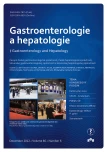Does golimumab extend the spectrum of anti-TNFα inhibitors for inflammatory bowel diseases?
Authors:
M. Lukáš
Authors‘ workplace:
Klinické a výzkumné centrum pro střevní záněty, ISCARE a 1. LF UK v Praze a Ústav klinické biochemie a laboratorní diagnostiky, 1. LF UK v Praze
Published in:
Gastroent Hepatol 2012; 66(6): 465-469
Category:
IBD: Review Article
Overview
Golimumab is a new drug which belongs to class of anti-TNFα inhibitors. This drug was prepared due to unique synthesis from hybridoma cells lines which were derived from transgenic mouse. The specific golimumab synthesis granted its human origin and some favourable pharmacological properties. In PURSUIT study has been shown that golimumab is very effective therapy and induces and maintains a clinical response, clinical remission, mucosal healing and improves the quality of life in patients with moderately to severely active ulcerative colitis. The position of golimumab in clinical practice in patients with ulcerative colitis has to be proved in the next clinical studies.
Key words:
biological therapy – ulcerative colitis – inflammatory bowel diseases
The authors declare they have no potential conflicts of interest concerning drugs, products, or services used in the study.
The Editorial Board declares that the manuscript met the ICMJE „uniform requirements“ for biomedical papers.
Submitted:
22. 11. 2012
Accepted:
10. 12. 2012
Sources
1. Bortlík M, Ďuricová D, Kohout P et al. Doporučení pro podávání biologické terapie u idiopatických střevních zánětů. Gastroent Hepatol 2012; 66(1): 12–22.
2. Dignass A, Lindsay JO, Sturm A et al. Second european evidence-based consensus on the diagnosis and management of ulcerative colitis Part 2: Current management. J Crohn Colitis 2012; 6(10): 991–1030.
3. Sandborn W, Feagan BG, Marano CW et al. A phase 2/3 randomized, placebo-controlled double blid study, to evaluate the safety and efficacy of subcutaneous golimumab induction therapy in patients with moderately to severe active ulcerative colitis. PURSUIT SC. Gastroenterology 2012; 142(5): S161.
4. Rutgeerts P, Feagan BG, Marano C et al. A Phase 3 randomized, placebo controlled, double blind study to evaluate the safety and efficacy of subcutaneous golimumab maintenance therapy in patiens with moderately to severely active ulcerative colitis: PURSUIT – MAINTENANCE. Gut 2012; 44 (Suppl 2): OP 344.
5. Ben-Bassat O, Iacono A, Irwin PS et al. Golimumab for treatment of moderate to severe anti-TNF refractory Crohn´s disease: Open label experience. Gastroenterology 2012; 142(5): S804.
6. Lonberg N. Human antibodies from transgenic animals. Nature Biotechnology 2005; 23(9): 1117–1125.
7. Shealy D, Cai A, Staquet K et al. Characterisation of golimumab, a human monoclonal antibody specific for human tumor necrosis factor. Landes Bioscience 2010; 2(4): 428–439.
8. Smolen JS, Kay J, Doyle MK et al. Golimumab in patients with revmatoid arthritis after treatment with tumor necrosis sloha inhibitors (GO-AFTER study): a multicentre, double-blind, randomised placebo-controlled, phase III. Lancet 2009; 374(9685): 210–221.
9. Reinisch W, Sanborn WJ, Holmes DW et al. Adalimumab for induction clinical remission in moderately to severely active ulcerative colitis: results of a randomised controlled trial. Gut 2011; 60(6): 780–787.
10. Sandborn W, Van Asche G, Reinisch W et al. Adalimumab induces and maintains clinical remission in patients with moderate – severe ulcerative colitis. Gastroenterology 2012; 142(2): 257–265.
11. Jarnerot G, Hertervig E, Friis-Liby I et al. Infliximab as a rescue therapy in severe to moderately severe ulcerative colitis: a randomized, placebo-controlled study. Gastroenterology 2005; 128(7): 1805–1811.
12. Rutgeerts P, Sandborn WJ, Feagan BG et al. Infliximab for induction and maintenance therapy for ulcerative colitis. N Engl J Med 2005; 353(23): 2462–2476
Labels
Paediatric gastroenterology Gastroenterology and hepatology SurgeryArticle was published in
Gastroenterology and Hepatology

2012 Issue 6
- Possibilities of Using Metamizole in the Treatment of Acute Primary Headaches
- Spasmolytic Effect of Metamizole
- Metamizole at a Glance and in Practice – Effective Non-Opioid Analgesic for All Ages
- The Importance of Limosilactobacillus reuteri in Administration to Diabetics with Gingivitis
-
All articles in this issue
- Autumn of congress
- Inflammatory bowel diseases in Karlovy Vary 2012
- Report from 7th CEURGEM (Central European Gastroenterology Meeting)
- Look back at UEGW 2012: The European Gastroenterological Fedaration is a successful project
- OESO – 11th world conference, COMO, Italy, September 1–4th 2012
- EURO-NOTES 2012, August 4–6th 2012, Prague
- VI. Beskydy Endoscopic Workshop
- Epidemiology of Helicobacter pylori infection in the Slovak Republic
- Clostridium difficile – a rising threat?
- Changes in body weight and eating habits of obese patients after sleeve gastrectomy – a pilot study
- Selected gastrointestinal diseases and nutritional disorders associated with osteoporosis
- Somatostatin and its use
- Does golimumab extend the spectrum of anti-TNFα inhibitors for inflammatory bowel diseases?
- Comparison of the tolerance and quality of bowel preparation before colonoscopy using picosulphate / magnesium citrate or polyethylene glycol in different dosing regimens
- First ”POEM“ (Per Oral Endoscopic Myotomy) in the Czech Republic
- Spontaneous intramural hematoma of the small bowel is a rare complication due to an oral anticoagulation therapy
- Rare mycotic complications following liver transplant
- Evening with a genius
- 30 years since the first endoscopic papillosphincterotomy in the then Czechoslovakia
- Omeprazole
- Gastroenterology and Hepatology
- Journal archive
- Current issue
- About the journal
Most read in this issue
- Somatostatin and its use
- Omeprazole
- Clostridium difficile – a rising threat?
- Selected gastrointestinal diseases and nutritional disorders associated with osteoporosis
